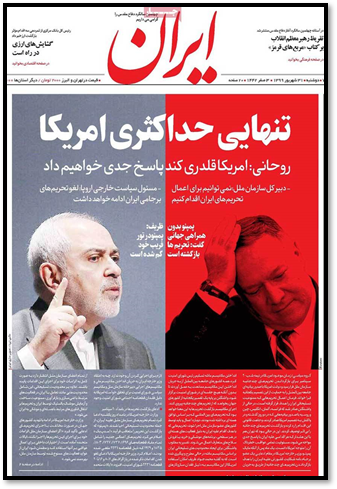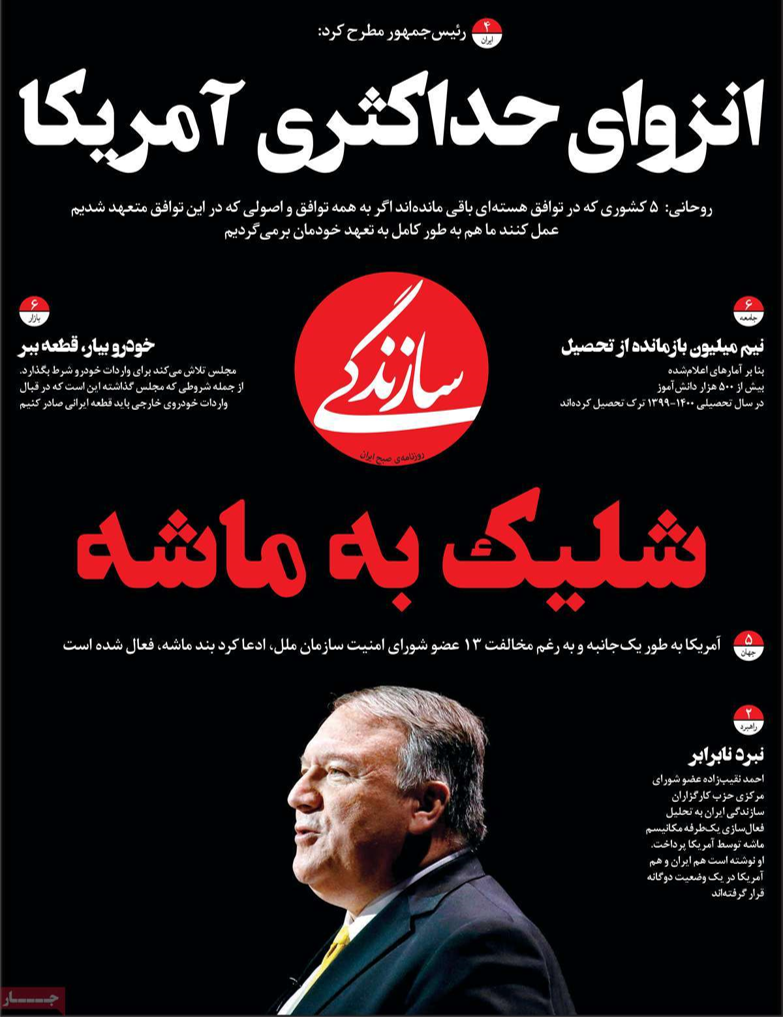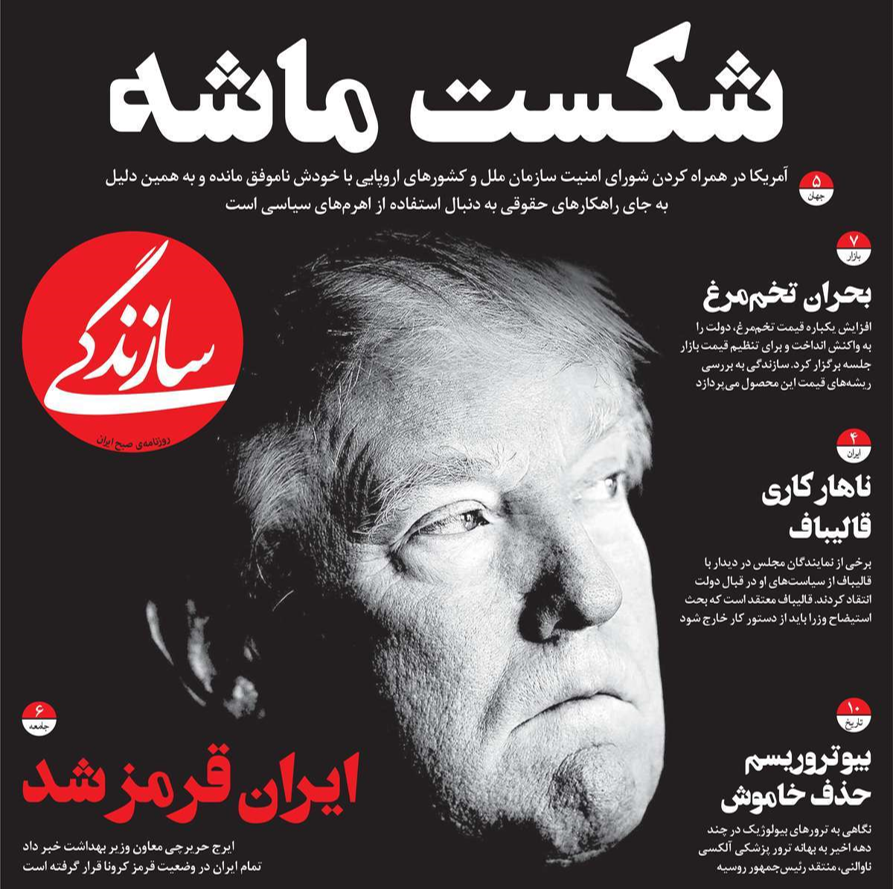On September 20, Iran condemned the U.S. decision to reimpose U.N. sanctions that had been lifted as part of the 2015 nuclear deal. The United States had no legal standing to invoke sanctions since it had withdrawn from the agreement in May 2018, officials said. Foreign Minister Mohammad Javad Zarif said that the United States would effectively be punishing countries that honored their commitments to the Joint Comprehensive Plan of Action (JCPOA) and U.N. Resolution 2231, a U.S. resolution passed unanimously by the Security Council. Secretary of State Mike Pompeo is living in a “parallel universe,” Zarif tweeted on September 20.
- Related Material: "US: Snapback Sanctions Go Into Force"
- Related Material: "Major Powers: On Snapback Sanctions"
President Hassan Rouhani said the United States had damaged its credibility. Most of the 15 Security Council members—including Britain, China, France, Germany and Russia, the original signatories to the deal—rejected the U.S. move. The Trump administration’s “maximum pressure” campaign has “turned into the maximum isolation of the United States,” Rouhani said in a cabinet meeting on September 20. The following are comments by Iranian officials and front pages of Iranian newspapers.
Foreign Minister Mohammad Javad Zarif to the Council on Foreign Relations on September 21: “Well, the sanctions that the United States has been imposing on Iran, it's nothing new. Secretary Pompeo, I think, as we speak, is trying to gain some attention by having a press conference. It seems, at this very moment, announcing new sanctions. I don't think that's anything new. And I don't think it will have any more significant impact on Iran. The United States has exerted all the pressure it could on Iran. It had hoped that these sanctions will bring a population to their knees. It didn't. That's why they withdrew from JCPOA. That's why they started maximum pressure. That's why they took a resolution to the Security Council. That's why after they failed, they started this so-called process of snapback. And I have to say that the words 'snapback' doesn't appear in either JCPOA or Security Council Resolution 2231. And they failed.
“Now, they are taking retribution not against us, but against the entire world by saying that anybody who does not accept—I mean, it’s as if somebody said: There is a U.N. Security Council resolution. And if you don’t accept it, I’m going to kick you. This is the type of global democracy the United States believes in.”
Zarif in tweets on September 20:
The world says NO Security Council sanctions were restored.
— Javad Zarif (@JZarif) September 20, 2020
But Mr. "We lied, We cheated, We stole" threatens to punish a world that refuses to live in his parallel universe.@realDonaldTrump should change tack before @SecPompeo further turns #MAGA into a global laughing stock. pic.twitter.com/PeOgJRR2SZ
The issue with mythomaniacs— who just can't help themselves in their pathological lying—is that they actually get lost in their own web of deceit.
— Javad Zarif (@JZarif) September 20, 2020
Exhibit A: pic.twitter.com/7CVpVaRGcs
Zarif in a tweet on September 17:
Wrong again, @SecPompeo.
— Javad Zarif (@JZarif) September 17, 2020
Nothing new happens on 9/20
Just 𝙍𝙀𝘼𝘿 Res.2231
Bolton—who convinced the boss to order you to “CEASE US participation”—did.
In his words:
-Process is not "simple", automatic or snappy. But intentionally "complex & lengthy"
-US is 𝙉𝙊𝙏 a participant. pic.twitter.com/r01YWdV0hp
President Hassan Rouhani at a cabinet meeting on September 20: “When the United States makes an illegal and incorrect request and it is opposed by the overwhelming majority of the members of the Security Council and it is rejected, from now on, what the United States speaks about means nothing but rebellion, and no one will accept it, and the consequences of such words and such positions will go back to the United States itself.”
“Americans have always thought that for various historical reasons and the traditional friends they have in the Security Council, the council was their strong point and they would not fail in advancing their plans in the Council, but the world saw that 13 out of 15 members of the Security Council opposed the United States and supported the Joint Comprehensive Plan of Action (JCPOA) and did not accept their opinions.”
“It was clear that the United States would inevitably fail, but at the same time, the approach the Security Council took was a very valuable method; 'ignoring the U.S. request and letter' and not convening in any meeting to consider the U.S. request.”
“We have always said that there is no approach towards the Iranian nation other than respecting the rights for the Iranian nation and speaking with respect to the Iranian nation, and whoever takes the approach of bullying the Iranian people will definitely fail at the end of the day.”
“Indonesia and Niger, as former and current chairmen of the Security Council, have stood firm against illegal moves of the United States.”
“I would also like to thank Russia and China, as two friendly countries, for standing firm against the irrationality of the United States, both in the past and the present.”
“I must also thank the other members of the Security Council, including European and non-European countries, who stood up to the United States by supporting Iran.”
“I also declare once again to the P4+1 that if the five countries that remain in the nuclear agreement today comply with all the agreements and principles that we agreed in this deal, we will also be fully committed to our obligations.”
“The reason we reduced our JCPOA commitments was because we waited a year and the P4+1 did not respond positively to us in the economic field, although they have always taken a good position legally and politically.”
“The enemies thought that the people would give in to their coercion, but the Iranian people stood their ground and resisted, and these successes are the result of this resistance.”
“The success that we have achieved in terms of diplomacy is due to the resistance of the nation and the guidance of the Supreme Leader, and as long as this guidance and popular support exists, we can well stand up to the irrational words and actions of the United States, and there is no doubt that the ultimate victory is for a nation that has stood and will stand firm for its rights.”
Foreign Ministry Spokesperson Saeed Khatibzadeh on September 20:
FM spokesman @SKhatibzadeh: The regime in the White House has no option just to respect the international regulations and norms, to stop terrorizing the world. pic.twitter.com/1G6IkTwX3m
— Iran Foreign Ministry 🇮🇷 (@IRIMFA_EN) September 20, 2020
Ministry of Foreign Affairs in a tweet on September 20:
— Iran Foreign Ministry 🇮🇷 (@IRIMFA_EN) September 20, 2020
Ministry of Foreign Affairs in a statement on September 20: “The United States falsely claims that the U.N. Security Council sanctions against the Islamic Republic of Iran are back in effect at a time when the Council has basically rejected a demand by the U.S., as a non-signatory to the JCPOA, to trigger the trend of reinstating the sanctions. Moreover, such a trend never got started in the first place to produce a result today. The U.S. secretary of state himself knows well that his claim regarding the reinstatement of U.N. Security Council sanctions is groundless and invalid and lacks any legal effect. Therefore, he, using his own notorious method, tries to intimidate other countries by threatening to slap international sanctions on them, which is the best testament to the United States’ admission of failure in its effort at the UN Security Council.
“As the Islamic Republic of Iran has reiterated time and again, the U.S. regime is the biggest threat to world peace and security. This reality had never been exposed as much it has today when the US is overtly threatening and intimidating the world and ignores U.N. Security Council resolutions.
“In 2018, when the United States unilaterally withdrew from the Joint Comprehensive Plan of Action (JCPOA) in breach of clearly stipulated international regulations, and waived any right to use the mechanisms inserted in the accord and in Resolution 2231, it (the U.S.) hoped it would bring Iran to the dilemma of submission or collapse by using the so-called ‘maximum pressure’ strategy.
“However, two years on since then, the U.S. is now more isolated than ever in advancing the project of portraying Iran as a security threat. Frustrated at having failed to build a consensus against Iran, the U.S. has turned to bullying and holding the international community to ransom. At a time when almost all members of the U.N. Security Council have straightforwardly rejected the United States’ ludicrous approach vis-à-vis U.N. Security Council Resolution 2231, the U.S. regime is, in line with its unilateral and force-oriented policy, threatening to impose sanctions against world countries for their compliance with international regulations.
“The Islamic Republic of Iran regards the U.S. secretary of state’s wrathful statements as measures which are only good for domestic political use and which are the result of weakness and disappointment and hearing repeated “No’s” from the international community in recent months as well as back-to-back defeats against Iran’s active diplomacy. Iran recommends the U.S. president not isolate himself and his country at the international level any further by consulting people who are unfamiliar with the global situation.
— Iran Foreign Ministry 🇮🇷 (@IRIMFA_EN) September 20, 2020
“The approach adopted by the current U.S. regime amounts to a big danger to international peace and security as well as an unprecedented threat to the U.N. and the Security Council. This time, the U.S. secretary of state has not only ridiculed all principles of international law and the U.N. Charter, but also challenges the international community officially and openly, and converts his government’s bullying and recalcitrance from behind-the-scenes actions into an openly flagrant move.
“The Islamic Republic of Iran emphasizes that if the U.S. makes any move in line with these threats, whether alone or in cahoots with the few cronies of its own, it will be met with serious reaction and will be responsible for all the dangerous consequences of its move.”
U.N. Ambassador Majid Takht Ravanchi in a letter to U.N. Secretary General Antonio Guterres on September 19: “In its letter dated 20 August 2020 to the President of the Security Council, the United States illegally claimed to be a participant to the Joint Comprehensive Plan of Action (JCPOA), attempting to unlawfully invoke operative paragraph 11 of resolution 2231 (2015). The United States has recently claimed that the Security Council resolutions that have been terminated pursuant to paragraph 7 (a) of resolution 2231 (2015) will be reinstated on 20 September 2020.
“In reaction to the aforesaid letter of the United States, none of the Security Council members accepted the eligibility of that country to initiate a process to reinstate the Security Council resolutions that have been terminated pursuant to paragraph 7 (a) of resolution 2231 (2015). Rather, through individual or joint letters addressed to the President of the Security Council, 13 members of the Council -- including all remaining participant States of the Joint Comprehensive Plan of Action who are Council members -- have unequivocally rejected the legal merit of the United States’ letter.
“Similar views have also been expressed by the overwhelming majority of the Security Council members in the meeting of the Council on 25 August 2020, during which, the President of the Council, in response to the questions posed to him on the subject, stated that “having consulted with members and received letters from many member countries, it is clear for me that there is one member which has a particular position on the issue, while there are significant numbers of members who have contesting views. In my view, there is no consensus in the Council, thus the President is not in the position to take further action” (S/2020/837).
“Reaffirming that, according to resolution 2231 (2015), the right to initiate a process to reinstate the Security Council resolutions that have been terminated pursuant to paragraph 7 (a) of resolution 2231 (2015) has been reserved only for “the JCPOA participant States”, the members of the Security Council, through the abovesaid letters and statements, have also made it clear that, following its withdrawal from the Joint Comprehensive Plan of Action, the United States is not a “JCPOA participant” anymore, has no right to initiate the concerned process, and accordingly, its letter cannot be considered for the purpose of paragraph 11 of resolution 2231 (2015), thus is void of any legal effect now and in the future.
“Likewise, in a statement on 20 August 2020, the High Representative of the European Union for Foreign Affairs and Security Policy and Coordinator of the Joint Commission of the Joint Comprehensive Plan of Action stated that “as I have repeatedly recalled, the United States unilaterally ceased participation in the Joint Comprehensive Plan of Action (JCPOA) by presidential memorandum on 8 May 2018 and has subsequently not participated in any JCPOA-related activities. It cannot, therefore, be considered to be a JCPOA participant State for the purposes of possible sanctions snapback foreseen by the resolution” (S/2020/839).
“Moreover, in the Chair’s statement following a meeting of the Joint Commission of the Joint Comprehensive Plan of Action on 1 September 2020, the remaining participant States of the Joint Comprehensive Plan of Action “reaffirmed that the United States unilaterally announced its cessation of participation in the JCPOA on 8 May 2018 and that it had not participated in any JCPOA-related activities subsequently. Participants reconfirmed that it therefore could not be considered as a participant State”. “The remaining participants also “reaffirmed their various statements and communications made previously at the UN Security Council including that of the High Representative of 20 August as the Coordinator of the JCPOA to the effect that the US cannot initiate the process of reinstating UN sanctions under UNSC resolution 2231”[1].
“The views of the Islamic Republic of Iran on the above-mentioned attempt by the United States is also reflected in the aforesaid letter of our Minister for Foreign Affairs (S/2020/814), according to which, the letter by the United States is null and void, has no legal standing and effect and is thus completely unacceptable.
“It would be appreciated if the present letter could be circulated as a document of the Security Council.
“Please accept, Excellency, the assurances of my highest consideration.”
Mahmoud Vaezi, Chief of Staff to President Hassan Rouhani, on September 21:
"Iranian Foreign Ministry's active diplomacy & its extensive efforts drove the #US to isolation in the international community," said Presidential chief of staff @Dr_Vaezi on Monday. pic.twitter.com/UttiArFWdJ
— IranGov.ir (@Iran_GOV) September 21, 2020
"As it was predicted, #US political and illegal attempts once again were failed and the legitimacy of #Iran's position was proved by wholesale rejection of the US in the international community," @Dr_Vaezi underlined.
— IranGov.ir (@Iran_GOV) September 21, 2020
Newspaper Front Pages
September 20
Iran (conservative newspaper)
-
U.S.' Maximum Loneliness

Sazandegi (centrist newspaper)
-
Maximum Isolation
- U.S. Unilaterally Claims Snapback Mechanism Activated Despite Opposition of 13 UNSC Members

September 21
Sazandegi (centrist newspaper)
-
Trigger Failure: U.S. Fails to Get UNSC, E3 on Board, Resorts to Use of Political Leverage Instead of Legal Solutions

*Translations adapted from Iran Front Page News.
